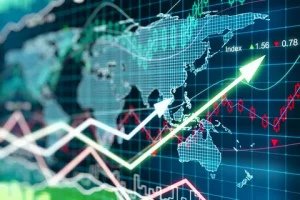The global economy is in a constant state of flux, influenced by a myriad of factors ranging from technological advancements to geopolitical shifts. Understanding the current trends in global economic development is crucial for policymakers, businesses, and individuals alike. This article delves into some of the most significant trends shaping the global economic landscape today.
Technological Advancements
One of the most influential drivers of global economic development is technological advancement. Innovations in artificial intelligence (AI), blockchain, and the Internet of Things (IoT) are revolutionizing industries and creating new economic opportunities. AI, for instance, is being used to optimize supply chains, improve customer service through chatbots, and even predict market trends. Blockchain technology is enhancing transparency and security in financial transactions, while IoT is enabling smarter cities and more efficient industrial processes.
These technologies are not only boosting productivity but are also creating new markets and job opportunities. However, they also pose challenges such as the displacement of traditional jobs and the need for new skill sets. Governments and educational institutions must therefore focus on reskilling and upskilling the workforce to keep pace with these technological changes.
Globalization and Trade

Globalization continues to be a major force in economic development. The interconnectedness of markets has led to increased trade and investment flows, contributing to economic growth. However, globalization is also facing challenges such as trade wars and protectionist policies. The U.S.-China trade war, for instance, has had significant repercussions on global supply chains and economic stability.
Despite these challenges, regional trade agreements like the Comprehensive and Progressive Agreement for Trans-Pacific Partnership (CPTPP) and the African Continental Free Trade Area (AfCFTA) are fostering economic integration and cooperation. These agreements aim to reduce trade barriers, enhance market access, and promote sustainable economic development.
Sustainable Development
Sustainability has become a cornerstone of global economic development. The United Nations’ Sustainable Development Goals (SDGs) provide a framework for addressing issues such as poverty, inequality, and climate change. Businesses and governments are increasingly recognizing the importance of sustainable practices, not just for ethical reasons but also for long-term economic viability.
Renewable energy is one area where sustainability and economic development intersect. Investments in solar, wind, and other renewable energy sources are creating jobs and reducing dependence on fossil fuels. Moreover, sustainable practices in agriculture, manufacturing, and other sectors are contributing to economic resilience and environmental stewardship.
Demographic Shifts
Demographic changes are another significant factor influencing global economic development. Aging populations in developed countries are leading to labor shortages and increased healthcare costs. In contrast, developing countries with younger populations are experiencing rapid urbanization and economic growth.
These demographic shifts have implications for labor markets, social services, and economic policies. For instance, countries with aging populations may need to invest more in healthcare and pension systems, while those with younger populations may focus on education and job creation.
Digital Economy
The digital economy is rapidly expanding, driven by the proliferation of the internet and digital technologies. E-commerce, digital finance, and online services are transforming traditional business models and creating new economic opportunities. The COVID-19 pandemic has further accelerated the shift towards digitalization, with more people working remotely and relying on digital platforms for goods and services.
However, the digital divide remains a significant challenge. While developed countries are reaping the benefits of the digital economy, many developing countries lack the necessary infrastructure and digital literacy. Bridging this digital divide is essential for inclusive economic development.
Geopolitical Shifts
Geopolitical dynamics are also shaping global economic development. The rise of China as an economic superpower, the re-emergence of Russia, and the shifting alliances in the Middle East are influencing global trade, investment, and economic policies. These geopolitical shifts can create both opportunities and challenges for economic development.
For example, China’s Belt and Road Initiative (BRI) aims to enhance infrastructure and trade connectivity across Asia, Europe, and Africa. While the BRI has the potential to spur economic development, it also raises concerns about debt sustainability and geopolitical influence.
Financial Markets and Investment

Financial markets play a crucial role in global economic development by allocating capital to productive uses. The rise of fintech and digital currencies is transforming traditional financial systems and creating new investment opportunities. However, financial markets are also subject to volatility and risks, as evidenced by the 2008 financial crisis and the more recent market fluctuations due to the COVID-19 pandemic.
Regulatory frameworks need to adapt to these changes to ensure financial stability and protect investors. Moreover, sustainable and impact investing are gaining traction, with more investors looking to generate positive social and environmental outcomes alongside financial returns.
Conclusion
The trends in global economic development are multifaceted and interconnected. Technological advancements, globalization, sustainability, demographic shifts, the digital economy, geopolitical dynamics, and financial markets are all playing pivotal roles in shaping the economic landscape. While these trends offer numerous opportunities for growth and development, they also pose challenges that require coordinated efforts from governments, businesses, and civil society.
Understanding these trends is essential for making informed decisions and fostering sustainable and inclusive economic development. As the global economy continues to evolve, staying abreast of these trends will be crucial for navigating the complexities and seizing the opportunities of the future.




